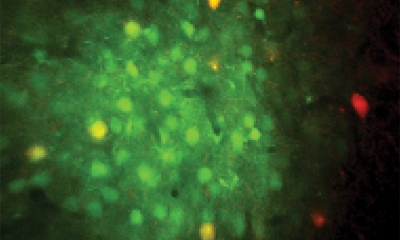Nicholas Priebe, an associate professor of neuroscience in The University of Texas at Austin's College of Natural Sciences, and three colleagues have been awarded a Human Frontier Science Program research grant worth $1.05 million over three years to study how our sensory systems change as the environment changes.
 Imagine you're sitting in your house for a long time, then walk out into the sunlight. At first, it seems so bright that it's hard to see clearly. Over time, you get accustomed to the large change in brightness, and it doesn’t seem so bright anymore. Because our brains can only interpret signals within a narrow range, they have to quickly adapt to changes in brightness. The same kind of adaptation happens with other senses, such as hearing, for example when you spend time on a noisy airplane.
Imagine you're sitting in your house for a long time, then walk out into the sunlight. At first, it seems so bright that it's hard to see clearly. Over time, you get accustomed to the large change in brightness, and it doesn’t seem so bright anymore. Because our brains can only interpret signals within a narrow range, they have to quickly adapt to changes in brightness. The same kind of adaptation happens with other senses, such as hearing, for example when you spend time on a noisy airplane.
"If your brain didn't adapt, it would be hard to have conversations," says Priebe.
Historically, neuroscientists have used different experimental approaches to study adaptation in vision, hearing and touch. The goal of the new research is to apply the same experimental approaches to all three senses in rodents and search for common components of adaption across them.
Priebe specializes in vision. His colleagues are Israel Nelkin, an expert on hearing at Hebrew University in Israel, Ilan Lampl, an expert on touch at the Weizmann Institute of Science in Israel, and Adrienne Fairhall, a theorist at the University of Washington in Seattle.
The Human Frontier Science Program is an international program of research support in the life sciences implemented by the International Human Frontier Science Program Organization (HFSPO) based in Strasbourg, France.

















Comments